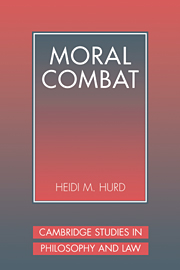Book contents
- Frontmatter
- Contents
- Preface
- Acknowledgments
- Part I The Dilemma of Legal Perspectivalism
- 1 The Incompatibility of Weak Retributivism, the Rule of Law, and the Separation of Powers
- Part II Sources of the Dilemma of Legal Perspectivalism
- Part III The Moral Case for Legal Perspectivalism
- Part IV The Moral Case Against Legal Perspectivalism
- Part V Resolving the Dilemma of Legal Perspectivalism
- Bibliography
- Index
1 - The Incompatibility of Weak Retributivism, the Rule of Law, and the Separation of Powers
Published online by Cambridge University Press: 05 November 2011
- Frontmatter
- Contents
- Preface
- Acknowledgments
- Part I The Dilemma of Legal Perspectivalism
- 1 The Incompatibility of Weak Retributivism, the Rule of Law, and the Separation of Powers
- Part II Sources of the Dilemma of Legal Perspectivalism
- Part III The Moral Case for Legal Perspectivalism
- Part IV The Moral Case Against Legal Perspectivalism
- Part V Resolving the Dilemma of Legal Perspectivalism
- Bibliography
- Index
Summary
Since our fundamental commitments to weak retributivism, the rule of law, and the principles of democracy and the separation of powers are not in obvious conflict, the dilemma engendered by their mutual defense takes some construction. Let me begin at its seemingly remote beginning.
MORAL CORRESPONDENCE
Consider the following hypothetical. Smith is attacked by a hoodlum while walking her dog through the city park. Smith justifiably believes that her life is in peril, and she is thus forced to choose between killing the hoodlum and being killed or maimed herself. Jones is a jogger who witnesses the hoodlum's attack on Smith. Unable to affect the hoodlum's conduct, Jones must choose between permitting Smith to kill the hoodlum and intervening to prevent that killing. Long is a concession stand owner who also witnesses the event. Long is unable to affect the conduct of either the hoodlum or Smith, and so can only choose between restraining Jones from intervening to prevent the hoodlum's death or allowing that intervention.
The morality of each actor's choice appears to be determined by what I shall call the “correspondence thesis.” The correspondence thesis asserts a moral claim about the justification of codependent actions. It holds that the justifiability of an action determines the justifiability of permitting or preventing that action. According to the correspondence thesis, if Smith is justified in killing the hoodlum (as a means of self-defense), then Jones is not justified in intervening to prevent that killing, and, hence, Long is justified in restraining Jones's intervention.
- Type
- Chapter
- Information
- Moral CombatThe Dilemma of Legal Perspectivalism, pp. 3 - 24Publisher: Cambridge University PressPrint publication year: 1999



